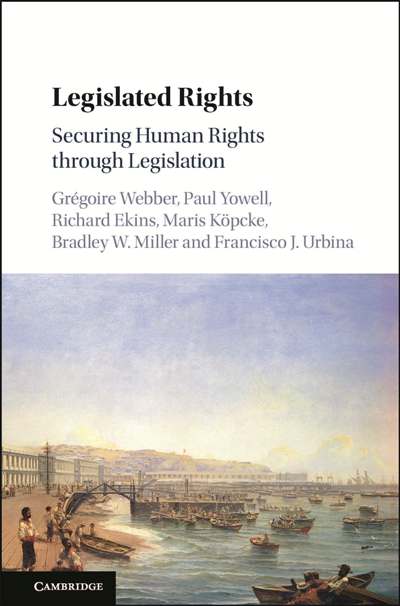
An overarching message of the Canadian Charter of Rights and Freedoms is that the rights of Indigenous peoples, seniors, voters, families, persons with disabilities, and others are the responsibility of government. In the book Legislated Rights: Securing Human Rights Through Legislation (Cambridge), Professor Grégoire Webber and his co-authors explore some of the philosophical underpinnings of this commitment. In light of some rulings by the country’s highest court over the past years, the book couldn’t be more timely.
The Supreme Court of Canada has struck down legislative prohibitions on physician-assisted suicide, restrictions on judicial discretion in criminal sentencing, prisoner voting bans, and others, in each case finding that interferences with rights and freedoms could not be justified. That judicial power has been a significant contribution of the Charter.
But to Webber, Canada Research Chair in Public Law and Philosophy of Law at Queen’s, there is another more fundamental and more significant promise in the Charter. “It is one that is less celebrated, too often overlooked and sometimes overshadowed by the important role of courts under the Charter,” he says. “That promise is to have government and Parliament actively and consciously committed to the respect, protection, and promotion of rights. It is a promise to situate the Charter’s influence within the workings of government and Parliament.”
The legislature is well placed to secure and promote human rights, argue the authors. “It may seem an obvious proposition,” says Webber, “but its truth and importance have been obscured in modern, court-centred modes of human rights discourse.
“Our title, Legislated Rights, signals a contrast to the theory and practice of much contemporary human rights law, which privileges the judiciary as the principal defender of human rights,” he adds. “We aim to shift key premises of debate in human rights law, where it is regularly assumed that human rights are the special province of the courts and that legislation represents a threat rather than a means of protecting them.”
According to the authors, many aspects of human well-being identified in human rights instruments can be adequately advanced only through general measures adopted through legislative action. The book explores the moral value of legislation and its capacity to realize human rights, as well as the special role and responsibility of the legislature in securing human rights in positive law.
Even something as technical and detailed as legislation governing building codes can be understood to relate to human rights, purports Webber. This is something he and some co-authors witnessed first-hand in 2015, following their presentations of a few book chapters at the Pontificia Universidad Católica in Santiago, Chile. “While later touring Valparaiso, we experienced an 8.3-magnitude earthquake that struck the region,” Webber says. “Tsunami warnings resulted in the precautionary evacuation of roughly one million people. The lives of many, including those in or in proximity to high-rises, were saved by legislated measures imposing strict building code standards and a coordinated emergency response strategy.
“It is tragic that 15 people are reported to have lost their lives as a result of the earthquake – one in Valparaiso and most others in locations where it seems that modern codes have not been implemented,” he continues. “It is a testament, we argue, to the relationship between the right to life and positive, legislated measures that the casualties were no higher.”
Legislated Rights was officially launched before students and faculty members at Queen’s Law on November 19 in Webber’s panel discussion with Professor Jean Thomas of Queen’s Law, Professor Mark Walters, Law’89, of McGill Law, and Chief Justice Glenn Joyal of the Manitoba Court of Queen's Bench.
Thomas highlighted “the way the book makes a distinctive and important contribution: bringing together natural law theory, on one hand, which claims that law plays the necessary role of specifying abstract moral requirements; and a certain strand of rights theory, on the other hand, which points out the way in which the protection of a given human right requires the imposition of many different duties. The legislature is the lawmaking body, so the book argues, that can best perform these two connected roles.” She then raised some potential challenges associated with the relationship between human rights and politics and also queried the extent to which the book’s argument leaves scope for democratic deliberation and action.

Walters called the book an “eloquent exploration of a concept of the legislature that is based upon a tradition in legal thinking that stretches back to classical sources but which is not well-understood today – that the legislature’s principal task is to articulate in concrete ways legal relationships between us all that secure for us our human rights.” However, he stated, this view of the legislature is premised upon an understanding about how legislators approach their job. “Legislators must engage in reasoning about justice and just relations between people, and not simply about what their constituents want. Of course, it is not clear that legislators actually do this. But the book is a reminder of an ideal conception of the legislature that, if it played a bigger role in practical politics, would certainly be a good thing.”
Joyal gave his perspective on how political responsibility for rights can help shape a political culture in which the political branches assumes primary responsibility for securing human rights.
In the first published book review, Professor Adam J. MacLeod of Faulkner University states that “though Legislated Rights is primarily written for legal philosophers, it bears important lessons for all who work to secure human rights in law. It competently challenges conventional views about the supremacy of courts in specifying and vindicating rights. And it achieves its stated goal to reorient general thinking about the nature of rights, legislatures, and courts.”
For more information and to order a copy of Legislated Rights: Securing Human Rights Through Legislation, visit the Cambridge University Press website.